Tuesday, December 26, 2006
conversation between daughter and father
father (James, aged 37): Yes Anna
daughter: When I'm a grown up, if I have a little boy, I will call it James too
father: (bursting with pride): thats nice Anna
daughter (thinking hard): ......or I might call it James and the Giant peach
Friday, December 22, 2006
Wordsmiths
It also lets you make lists of particular types of words.
Like these:
more than human by Lampbane
tales from another world by squareintheteeth
scripted apathy by uselessness
the horizontal hula by nkocharh
Joycean vocab by inkhorn
I've listed some of the words Morrissey used on Hatful of Hollow. Slackagogo has made listings of words from XTC and The Ramones
Monday, December 18, 2006
Drawing for Cosmos
stars reflected in the reservoirs
Tuesday, November 28, 2006
Sunday, November 12, 2006
El mondo no eschuara
He had kicked off the project by going to Bogata and inviting:
“the shy, the dissatisfied, the narcissistic, the shower super-stars and anyone wanting to be someone else for a night”to come and record a karaoke version of a song from the album 'The world won't listen'.
He ended up getting a version of all 17 songs on the album, each sung by a different person. I managed to find a two minute sample of different parts of it, on You Tube: here it is:
As is usual with Phil Collins work it works as conceptual art: you can think about the ideas behind it, and why he chose to execute the ideas in the way he did. A project possible because of the globalisation of pop music and the English language, but worthwhile becasue of people's individual reaction to Morrissey's songs and appropriation of them as their own . But it also works without being art too, its moving and interesting to watch.
The Pretty Pretty thieves blog have a good review of a review of el mondo no eschuara/ the world won't listen, written by a Smiths fan.
Saturday, October 21, 2006
Phil Collins and the Turner Prize
Collins poses a question or a challenge to people in the city:
Come and tell us how appearing on a TV chat show has ruined your life (Istanbul)
Come and dance for eight hours non-stop at a disco (Ramallah)
Come and do a karaoke version of a song by The Smiths (Bogata)
Come to a hotel and remove articles of your clothing (Baghdad)The trivial nature of the challenges could appear insulting given the serious predicament of some of those cities. But Collins gives people the time and space to talk/sing/dance/pose for themselves. The challenge may come from a globalised nowhere, but the work itself reflects the people who stepped forward to answer it.
I've got tickets to see him talk about his Turner Prize entry on November 22.
The Turner Prize exhibition at Tate Britain has four artists exhibiting side by side for three months, then on December 4 one gets chosen to win the prize. I'm sure Collins will win. The opening hours of the exhibion are from 10am to 6pm each day. Collins is showing an eight hour long film (Return to the real), that starts at 10am each morning and finishes at 6pm. He hasn't left time for you to look at the work of the other artists.
The film consists of eight one hour long interviews with people talking about how appearing on a chat show ruined their life. You watch it in a room that is like a cinema, except you don't sit facing a screen. There are two screens : the one on the front wall shows the interviewee, the one on the back wall shows the interviewer. You sit on a side wall, and you have to turn your head from one screen to the other to follow the conversation, like watching a tennis match.
The interviewee has a single colour backdrop behind him or her, as though packaged for future television broadcast. The interviewer has no backdrop, you can see the studio monitors and equipment behind him, and the odd colleague wondering past to adjust a setting.
As you listen you realise that the tone of the conversation is intimate, undermining the gulf between the two roles, the two backdrops and the two screens . They may be on seperate screens now but when it was recorded they were sat facing each other, near each other. The conversations make no acknowledgement of the fact that they are destined to be viewed by people arriving half way through the interview. There is no summary of what has gone on before, no hype, no razzmattazz, no attempts to package the story or the person as being more interesting or more sensational than they come across in their own words.
Collins started with the chat show formula, with a sensational question about an intimate part of someone's life. He took the formula so far and then dropped it to leave us with a normal unsensationalised conversation. Just as the interviewees had, after appearing on the chat show, been left back with an unpackaged, unsensationalised life to lead.
If you do arrive half way through an interview and want to catch up on what you miss then you have to return to 'Return to the real' on a different day, but this time arrive a little earlier (or spend a bit less time looking at the work of the other artists).
When you leave the little cinema you pass by the second half of Colllins entry: a working office for Shady Lane Productions. You can look through the windows of the office and see Collins and his team working on his next project which is a challenge to the people of Britain, similar to that issued to the people of Turkey, to come and tell him how appearing on a chat show has adversly affected their life. You can open the window to the office if you want to chat to them, or want to volunteer your story to them.
A great idea by Collins, using the Turner Prize to repackage his last project (he did the work for Return to the Real for the Istanbul biennale in 2005) and to get free office space, heat, light and publicity for his next project. It works for me: its as though he is projecting his project forward in time and space. And projects are meant to be projected. Especially projects by film makers.
Wednesday, October 18, 2006
iLiKETRAiNS
They came on stage wearing shirt and tie, jeans, and old British Rail drivers' jackets. Most of them had beards. They played a brooding, intense, indie guitar music.
The first lines of their songs hook you straight away:
'I discharged myself today'
'Don't go into the kitchen, that's where the knives are'
No-one danced. You can't dance and brood at the same time.
A guitar broke just before they were going to start playing their song about chess. Whilst we were waiting the singer invited members of the audience to describe any chess matches that they had played recently. Sounded promising, but a flat headed screwdriver was found and the gig resumed.
I bought a t-shirt: a map of Britain with lots of squiggles on, each squiggle marking a railway line that Dr Beeching closed down in the 1960s: isobars linking places of equal marginalisation.
The highlight of the gig was their encore when they invited the support bands on stage to be the Greek chorus in their tragic dirge of venom 'The Beeching Report' : you can here the track on their myspace site
Monday, October 16, 2006
Celt

Yesterday we went to Hersham where the Wimbledon branch of the Retired Greyhound Trust have their kennels.
We took one of their greyhounds (Celt) for a twenty minute walk. It was a really nice thing to do, I would heartily recommend it.
Tania and Anna wanted to take Celt home with us (we couldn't because we haven't got a six foot fence all the way round our garden).
Thursday, October 12, 2006
Gravitas
I assumed it was some arty joke: that we the audience had to imagine it flying in our heads, just like Mark Titchner's Tuner prize entry asks us to use our psychic powers to lift his sculpture off the ground.
I confess to failing to lift Titchner's statue. I am aware that this failure of mine is one factor contributing to the likelehood that Titchner will not get the Turner prize (another being that Phil Collins's reality TV work has blown everyhting else away). I really did not feel confident about levitating that steamroller.
They didn't need me. At five o'clock an announcement was made, stewards went to the four corners of the parade ground and a driver in blue overalls walked over to the roller. She turned its engines on and drove it noisily round the parade ground a few times. Then all of a sudden it lifted up. She switched the engine off, and her and roller very quietly rotated round the counterweight for a few spins of the parade ground.
She closed her eyes, and driver and steamroller looked as serene and weightless as human being and machine have ever looked.
I felt as light as air, as though it was me flying above the ground, not the steamroller.
We don't have to let gravity keep us down
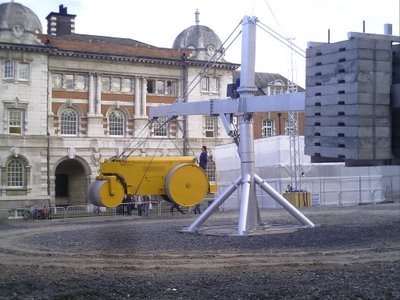
Technorati tags:
[Flying Steamroller]
[Chris Burden]
Monday, October 09, 2006
Peace trail
It was organised by the movement for the abolition of war: the kids got quiz questions and a passport that they had to get stamped at each point.
New Malden woodcraft folk were the first group to reach Trafalgar square, we were greeted by Bruce Kent who whisked us over to the South African embassy where Cyril Ndaba, South Africa's deputy high commissioner spoke to us about his country's journey from Apartheid. The kids listened enraptured even though they were really hungry.
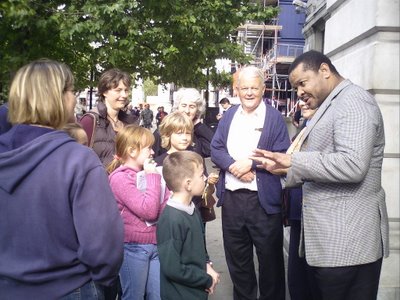
Mr Ndaba reminded the kids that some of their parents generation had stood outside the South African embassy in the continous picket of the embassy that went on round the clock for years and years during the Apartheid era. I told him of my happy teenage memories of going up to London for a night out and stopping off in Trafalgar square on the way back to Waterloo to sign the petition and maybe stand around for a few minutes. Bruce Kent rightly pointed out to the kids that it took a lot more dedication than that to keep the picket going all those years.
Saturday, October 07, 2006
Something simple to start with
Its a great idea. Potential readers get to see the the book emerging and to influence and enrich the book with their comments . The author has a means of generating interest in the book and anticipation of its arrival.
Psychologically writing a book must seem like a long, lonely haul. Writing a blog, with the immediate feedback you get from your readers, would keep your motivation up, and keep you turning up at your writing desk/laptop each morning.
Mitchell Stephens is blogging about the writing of his book, Without Gods, a history of atheism.
One of his posts posed the following question:
how should an atheist reply to a request by a dying friend that they see the light and start believing in god so that they can be re-united as friends in heaven?This promoted some great debate by both atheists and theists in the comment thread. Todd Sayre turned the question on its head and asked:
what should an atheists' last request be to a friend who believed in God?Todd thought that the best request the atheist could make would be:
feed my catsMitchell writes a really good blog, its thought provoking and I've learned plenty from it. My only quibble is that a number of his posts seem to be concerned with the question 'are the types of statement made by religions true?' I don't think there is such a thing in the entire universe as 'truth'.
Even if there was a such a thing as truth, we would not be able to express it using words. As Jorge Luis Borges is said to have said
everything put into words is fiction.Neither science nor religion can escape this limitation.
Any abandonment of the belief in universal truths must also involve an abandonment of attempts to demolish certain beliefs as universally untrue. Borges is useful again. An interviewer asked him whether he believed in angels. He replied:
Its a possiblility, after all it requires no more of a miracle than the fact that we are sitting here talking like thisI'm more interested in seeing whether religious discourse can be useful, than whether it could be true. For me religions would be just as useful if they dropped their claims that they convey the word of the creator(s).
I imagine the creator as a being that didn't use words at all, that has never had any use for them. I think the creator did something incredibly simple to bring the universe into being. Lifted a metaphorical finger, or breathed out or just thought 'what if'.
I believe this because it fits nicely with my other beliefs that anyone can do anything and that simple actions/events can have profound results, provided they resonate through enough things or people, over enought time.
The purpose of life? To explore some of the many possible consequences of that first breath/thought/lifting of a finger, and to set up a new universe of consequences and possibilities every time we breath, think or lift a finger.
Saturday, September 23, 2006
songs for life
Now i have an answer: If you loved the smiths and never saw them live, then go and see the Smyths. They do the songs justice. What more can we ask?
It is like when you support a big football team that all of a sudden goes bust.
A new team starts up, adapting the name slightly, in a much lower league. The devotees turn up, the spirit is the same, you can get much closer to the pitch and you can speak to the players after the game.
They played at the The Grey horse in kingston which is just down the road from us. Some fans of theirs had come from Edgware, another from Epping (I didnt envy their journeys back across town).
I was paranoid that we would be locked out from the surge of smiths fans descending to see them (as far as i know mozzer and the boys never came this way). So we got there at half eight. Tania and lynn got fed up standing around waiting and watching the new order tribute (who weren't bad) so they went off to see Tom do his stuff at the Willoughby, where they could sit down in comfort. I'd waited ninteteen years, ten months and twenty seven days to hear these songs performed live, another hour wasn't going to make any difference.
While i was waiting for them to come on i met natalie and lee who said the first song they danced to at their wedding was a smiths song (There is a light). Apparently the other guests had stood around a bit bemused. They run the Old Kings Head in hampton wick. They have tribute bands on at their pub too, they will have a tribute band to the Clash on soon (the Trash)
The Smyths came on and they started off with a barrage of songs from Hatful of Hollow which is the heart and soul of the The Smiths canon. Hand in glove, What difference does it make?. Singer says ''i think some of you might know this song': This charming man: everyone goes bolly.(What is bolly short for? I hope its nothing offensive).
They had flowers at the front, Natalie sniffed at them 'there not gladioli, I made my mum get gladioli for our wedding'. Oh what the hell. They were on the front of the stage, we passed them to each other, waved them around, danced with them, threw them over our shoulders. All of us at the front danced to every song, sang ever word, ended up arm in arm swaying to There is a light and then going bolly again to Big mouth strikes again. A great night.
[The Smiths]
[The Smyths]
Friday, September 22, 2006
If only
Thursday, September 14, 2006
Air
I like the way personal development books talk to me. You are human they say, you are uniquely valuable, it has taken the universe billions of years to create you, your body contains elements forged in the furnaces of distant and long gone stars, you are a part of the universe looking out at the universe, your ancestors, whovever they were, have survived and sometimes prospered in many different landscapes and circumstances. So long as you are striving towards your dreams you are not a failure. The universe that made you is on your side.
Recently I read 'A Heartbreaking Work of Staggering Genius' by Dave Eggers. It is not a personal development book. It is Dave Eggers writing his autobiograhy, but writing it as though it was a novel. It relates how both his parents died within a month of each other when Eggers was 21, leaving him with his kid brother (Toph, aged 7) to bring up.
His response to the cloying gravity of the double tragedy was to sell the suburban Chicago house and rocket off with Toph to sunny San Francisco. He describes bringing Toph up, how he read him John Hersey's 'Hiroshima' as his bed time story, how they evaluated flats to live in by how long an area of hall way they had for sliding along on their socks, how Eggers hoped to strike lucky with single mums at parents evenings at Toph's school.
He reaplays the thoughts that streamed through his heads at the momentous moments like when his mums nose wouldn't stop bleeding in the advanced stages of her cancer or when he is scattering her ashes into a local lake. His thoughts try to match the gravity of the situation but keep getting pulled back to prosaic matters like whether or not to switch the telly off or whether his feet are going to slip into the lake.
At the unmomentous moments his thoughts get pulled in the other direction. He is on the beech playing frisbee with Toph. Toph has perfected some show off moves, like lying on his tummy just as the frisbee is coming down and then jumping up and catching it. Eggers proudly describing how dumb these moves are, and the writing/thoughts flick from the frisbee throwing to the last breaths of his mother and back again.
Eggers expresses the same thoughts as the personal development books, but harshly, with the gloves off.
A TV company employee interviewed him after he applied to appear on her reality TV programme. She questioned whether he was an exhibitionist, willing to live in a televised house for two months, talking on tv about the tragedy of his family. Eggers replied:
''Someone wants to celebrate their existence and you call it exhibitionism. Its niggardly. If you don't want anyone to know about your existence you might as well kill yourself, your taking up space, air.''
Wednesday, September 06, 2006
Festive logic
He was misbehaving.
The following exchange took place:
Gran (annoyed): "stop that, or I'll get the elves and the fairies to tell santa not to bring you what you want for christmas"
Andrew (puzzled): "but how could they grandma? I don't know what I want for christmas."
Friday, September 01, 2006
Is the universe telling us where to go?
Globalisation offers a total disregard for where we are on earth and cuts all connections with place and with history. Is this subliminaly preparing us to make the break with earth? Preparing us for a day when humanity packs its Tesco bags with a few momentoes of our birth planet and takes itself off to a different home somewhere else in the solar system or the galaxy?
John Gray doesn't think we will ever get off the planet. He does not believe that we inexorably make progress towards higher and better knowledge. In Straw Dogs: thoughts on humans and other animals he tells us technology is not something that human beings control. Human beings will never be able to use their knowledge and technology to become master of their fate.
Human beings bring technology into the world, but once it is in the world it becomes another thing we interact with. And our interactions with it are shaped by the same power sruggles, economic forces, big business interests, organised crime interests, emotions and desires as is human interaction with anything else.
Gray talks about the folly of those plants set up to freeze people until such time as the technology comes along to bring humans back to life and to extend human life. The freezing plants will fall victim to economic collapse, revolution or war long before the life restoring/extending technology comes on stream.
Gray believes that the surge in human population is unsustainable for the earth's ecostystem. Human beings will live for a time in a distorted envrionment, geared to sustaining the unstustainable as long as possible, with less and less animal and plant species keeping us company. The rise in human numbers will start to plateau off, and then reverse as a result of war,disease, resource scarcity and/or climate change. The progress in knowledge and technology will become a double edged sword as weapons of mass destruction become more easily replicable. Wars of resources (for water, for oil, for land) become more virulent as the resources become scarcer.
His message is not entirely pessimistic. Human beings are not stronger than the earth's ecostystem and whatever we do we will not be able to destroy life on earth. The earth will survive us, and then forget about us. The growth of human numbers is a plague that earth will deal with and climate change may just be the method that the earth will use to shrug off its human burden.
Gray's work has helped me come up with an answer to that rather tricky question:
If there are is intelligent life on other planets near other stars, why haven't they come and found us on earth?
Maybe those life-forms that have survived long enough to contemplate space travel have lived in balance with their eco-system and not felt the need to indulge in any inter-stellar tourism or colonialism.
On earth those parts of the human race that have lived in balance with the environment have tended to be wiped out by more rapacious colonists who have developed powerful weapons to support their aggressive inclinations. So how could the universe ptotect planets with diverse and sustainable eco-systems from attack by an aggressive species who have used their own eco-system as a springboard to conquer others?
The best way for the universe to protect sustainable eco-systems would be to get the home planet of the aggressive species to reject them before they developed the power to pollute other parts of the universe.
Monday, August 28, 2006
Sixteen again
To celebrate I have renewed the Fulham season ticket I last had for the 1984/85 season, and started to wear my old Smiths T-shirts again.
On Friday Tania and I went to see Tom who plays his guitar under the name Boss Hog every Friday night in the Willoughby Arms in Kingston. Its a friendly old style pub, where the landlord has been there for exactly twelve years and says goodbye to you as you leave.
Tom played old songs by Billy Bragg, Jam, the Clash, The Cure. He sings them well, you can hear the words and he does them justice. At his best with 'Thats Entertainment', 'Say hello wave goodbye', 'Boys don't Cry' and 'Fairy tale from New York'.
Tom is a big Billy Bragg (and Fulham) fan. I told him at the interval that when I was sixteen I had done a deal with my sister: she could play Billy Bragg and I would play the Smiths. Like Spain and Portugal in the Renaissance dividing up the New World with the blessing of the Pope. I was the older brother, so like Spain I think I got the best of the deal (though history tells us that the Portugese part of the new world has won more world cups than the Spanish parts). In the gig Tom played the intro to 'Heaven Knows I'm Miserable Now' then stopped and told me I should have chosen Billy Bragg, because its easier to play on guitar.
In 184-85 I sat with my dad in Block C, row C of the Stevenage Road stand at Craven Cottage. The oldest football stand in London. A listed building. I dont think there were many other season ticket holders that year, I dont remember anyone who sat round us, they must have changed every game. Block C was great, half way towards the Hammersmith End, the goal Fulham usually shoot to in the second half. Row C was three rows back from the Enclosure, where people stood up. You could hear the banter from the Enclosure while enjoying the view from the seat. If you went with some friends you just forgot about the seat and went to stand up on the Enclosure. Average home gate that season must have been 6,500.
A lot has happened to Fulham since 1985. First the chairman Ernie Clay sold off the first team as part of his plan to kill the club and chuck the carcass to a property developer. He made his millions, and Craven Cottage was saved only by a collapse in the UK property market. Then ten years of slowly sinking down the divisions. By 1994 Fulham were in the bottom division, under the chairmanship of the cringeworthy Jimmy Hill. No money. The players had to eat sandwiches on the way home from away games as an economy measure, the coach wouldn't even stop at a fish and chip shop shop for them. The ground looking a bit dilapidated. The top of the Eric Miller stand spelt out a message to the world 'F LHA ' in big letters (wouldn't have liked to have been standing on the touchline when the U and the M fell off).
Then the wheel started to turn, Mickey Adams cobbled a team together out of nothing, on nothing, wins an unlikely promotion and the club attracted the friendly interest of Mohammed Al Fayed. Inexorable rise to the top division with plenty of good football with a gallic twist played along the way, some of it seen by me, an occassional visitor popping back to an old friend.
So here we are at the start of 2006/07. Not all that much cash compared to many in the rest of the Premiership (would have been nice to have had enough to have bought Emile Heskey). Our star midfielder Malbranque won't play for us again. Needing to work hard to keep the wheel rolling forward, to stop it rolling back.
You hear lots of conversations when you go to a football match. When people talked about our first game of the season (away at Man Utd) you always heard the word 'shambles'. When people spoke of Wednesday's game with Bolton you heard the word 'poor'. True you would have come across the same words if you had read a newspaper, but the journalists added another word, not to be spoken of, beginning with 'r' and ending in you being sent to Coventry and Southend and loosing millions of pounds.
You pass a second hand bookshop as you start walking from Putney Bridge station to Craven Cottage. In 1984/85 it was always shut on matchdays cos the owner coached a team on a Saturday. For the last ten years it has been open on matchdays: the bookseller got disullusioned with coaching 'couldnt stop my players from cheating' he said. On Saturday we met a Sheff United fan, Jim, looking at the books outside it. He had a thoughtful air, which could have been induced by the weighty tomes he was looking at, or by the fact that as he later told me, he was meeting his priest at the match, who in turn was going to work in Peru for three years.
I put the thoughtfulness down to the fact that Sheff United were, like us, facing a real test. Their first two games in the premiership had been against Liverpool and Tottenham, games they would expect to lose. This was the type of game they needed to get something from if they are going to avoid that 'r' word.
I told Jim, as I always tell every person I have met from Sheffield, that my sister lives in that City. He asked me whether Chris Coleman will still be manager of Fulham by Christmas, and told me that Fulham have not yet seen the best of Micheal Brown, who had been brilliant for Sheff U.
At the ground. We are in block CL, in the seats they have put over the old Enclosure, just underneath Block C where I used to sit. And on our seats is a T-shirt each with a picture of Jonny Haynes on it, a black and white picture ofthe black and white hero of the 1960s, to celebrate the fact that the Stevenage Road stand has been renamed after him. It is only us in the Johnny Haynes stand that get the T-shirt, we feel special, we know the rest of the ground wants one too. (The one on Andrew's seat is a junior size T-shirt, they must have put junior ones on the seats with kids season tickets)
So our second game in a week, our second game in our seats. All the people around us are the same people from Wednesday, we are safely cocooned within loyal season ticket holders. United start off better than Fulham: they are behind our defence in the first minute but our keeper Niemi catches it off the head of that big handful of a striker Rob Hulse.
Later the ball got booted into our block of the stand. A big bloke leaps up like David Seamen in his pomp to parry the ball and squashes his neighbour as he lands. The lady next to us turns to me and said 'not your turn this time'(referring to my catch of the ball on Wednesday) and asks whether I saw myself on telly . I had to confess that nobody had stopped me in the street.
Fulham start playing a bit after twenty minutes. Collins John (young, big, fast, still with a lot to learn) spun and hit the post. Jimmy Bullard had some shots. The sun came out after half an hour, it was shining right at us, and was being reflected from the floodlights. Two bright for Andrew, he couldnt look at the game. So we left our cocoon and went down behind the stand to buy a Fulham cap. While we were away Fulham scored. When we got back a fellow behind us tapped me on the shoulder to tell us how good Bullard's free kick was.
Second half. Fulham take a stanglehold on the midfield. we are down fairly low down, close to the action, Liam Rosenior rampages down the touchline near us. In 1985 we were watching his dad, Leroy, a great header of the ball, strong and powerful centre forward with a mild temprement. He later went to West Ham and famously scored a hat trick that got Chelsea relegated one year.
Tomas Radzinski comes on, looks like he is carrying a bit of weight. He was through on goal, he could see the whites of the goalkeeper's eyes but choses to pass instead. He is obviously short of confidence, Bullard almost saves his embarrasment by picking up the loose ball and cracking it against the post. Later Brian McBride surged through, underneath us again,this time their keeper managed to get a foot on it.
The three minutes of added time were a bit nervy, because all of a sudden Fulham pulled everyone back surrendering the ball to United. They had a couple of situations but we got the three points we deserved.
So the gloom has been lifted, at least for now, The midfield was solid and dominant, Bouba Diop was winning balls and playing neat passes, Jimmy Bullard was everywhere and did everything, Michael Brown passed well. Louis Boa Morte still hasnt found his touch yet though. Our central defence was solid, Philipe Christianval read things well and kept it simple. Lots of our threat came down the right from Liam Rosenior's forward runs. Just need one of our strikers to pick up confidence and start scoring goals.
So the walk back to Bishops Park, next to the Thames, tidal at Putney. One lad commented with suprise how much water there was in the Thames when there was virtually nothing there on Wednesday: could have been a metaphor for Fulham's week.
Talking of metaphors I read this joke in John T Barrow's book on infinity:
Question: what did the mystic say to the hamburger salesman?
Answer: 'make me one with everything'
At the end of the park we saw Jim from Sheffield again. He looked disappointed. He said we deserved our win, I wished him luck for their next home game (with Blackburn). Our next home game isn't till September 23, against our local rivals.
Will Chris Coleman still be Fulham manager at Christmas? I hope so.
Friday, August 25, 2006
Lowering the stakes
the Israeli-Palestinian conflict is not a war of religion or cultures or
traditions, but rather a real estate dispute--one that will be resolved not by
greater understanding, but by painful compromise.
When you boil that conflict down to a dispute over specific land and resources it loses its ability to fracture and destabilise the world.
Those promoting a war will always badge it as being a war for principles and values. A war for democracy, freedom, civilisation, the motherland, islam, national security: a war against terror, dictatorship, fundamentalism, zionism, genocide.
By appealing to these principles the conflicts becomes harder to resolve, more likely to spread, and more likely to lead to additional cruelty and racism.
Why do those promoting wars always appeal to principles? So that they can win the support of those who may not care about the particular resources being fought for, but do care for the values and principles being espoused.
Thursday, August 24, 2006
Great first touch
Half way through the first half Ian Pearce (Fulham's ageing centre-half) sliced a clearance into the crowd above were we sat. Someone in C block knocked it back down and I caught it as clean as a whistle.
In all the hundreds of football matches I have been to it was the first time I have touched the ball. Their were no stewards near. El Hadj Douf of Bolton down on the touchline was waiting patiently. I could do what I liked with it. I could have drawn a cartoon on it, given it a huge boot, pretended to eat it like it was an apple........
Or I could have tried to fulfill my childhood ambition: When I was six and my dad used to take me to East End Park to see Dunfermline Athletic I had a plan that the ball would come to me sitting in the stand and I would throw it into the other teams net to score a goal for Dunfermline.
I didn't do any of those things. I went to throw it back then remembered andrew sitting next to me and handed it to him. He delayed a bit then threw it forward.
It got to Diouf eventually. Bolton created a kerfufle in the penalty area from the throw but nothing much came of it.
The most suprising thing about the ball was that it felt cold. Its at the centre of the white heat of a premiership encounter and it feels cold.
Monday, August 21, 2006
Empathy
David Grossman is an Isreali novelist. Just 2 days after he and fellow novelists called for a ceasefire to halt his country's offensive in Lebanon, his son Uri, a tank commander in the Isreali army, died in the fighting. On Sunday the Observer printed his article Uri, my dear son. It is a beautiful piece of writing.
Uri was known as the lefty of his batallion. Grossman praises his son for sticking to his values even in the heart of the Isreali army. He writes:
'In our crazy, cruel and cynical world, it's not 'cool' to have values, or to be a humanist, or to be truly sensitive to the suffering of the other, even if that other is your enemy on the battlefield.'
The first casualty of war is not the truth: the first casualty of war is empathy for people who are defined as being on the other side of the conflict.
This asymmetry of empathy is encouraged by the way many media outlets report incidents of killing. The reporting gives out strong signals to us as to whether our basic emotional responses such as sympathy, fear and anger should be engaged.
Look out for the following signals in any report of deaths , on either side of any conflict:
- Do we get to hear about the lives of the people who died and the impact on the relatives and friends left behind?
- Do we get the impression that the victims are people like us, or different from us?
- Is the incident reported in a 'matter of fact' manner, or are expressions of shock and outrage added to the report?
- Is the action described as a 'military' action or a 'terrorist' action?
- Do we get the impression that a similar incident could put our lives under threat, or is this the type of thing that only happens to people unlike us?
Saturday, August 12, 2006
Politics and cream teas
We stayed in a National Trust cottage just off the South West Coastal footpath, in Higher Eype.
Six memorable things about the holiday were:
• The view from the cottage garden over the fields sloping down to the sea. We could see chesil beach sweeping round and the whole of the Isle of Portland stuck on the end of it like a big football boot
• Looking out of the window at night and seeing the lighthouse light twenty miles away on Portland Bill appear, disappear then re-appear half a minute later. Just like in Edward Ardizzone's Ginger and Tim book, where the children make friends with the lighthouse keeper. One stormy night Tim couldn’t sleep, so he lay awake watching the lighthouse light come and go. Then he noticed a long gap without the light coming back. He knew something was up so he woke up his dad (who told him to get back to bed) and then put on his rainmac and secretly crept outside and went to the boatman's house. Together they rowed over to the lighthouse just in time to surprise some robbers who had kidnapped the lighthouse keeper and switched the light off so they could steal its cargo when it crashed into the rocks. I had my waterproof at the ready, but the light kept coming back.

• Playing epic games of football in the garden with Dougie the farm sheepdog. We gave ourselves a point everytime we scored a goal against the little wall in front of the front door. Dougie got a point every time he intercepted a pass or blocked a shot. First to ten won. Once Dougie learned to read our tactics he won every single game. When I went out wide he would come out to block the cross, if I chipped it over him he would leap like a salmon to catch it, if I pulled it back behind him to Andrew he would turn quickly to get in front of his goal to block the shot. Even with the help of star players like Jack, Charlie and Kotalo (campers in the field opposite) we couldn’t beat Dougs. We got to 9-9 one game and Andrew’s shot agonisingly hit the post. From the restart Andrew tried to pass me, Dougie was there, business as usual, the chance had gone.

• Having bats fly so close to the house after dusk that we could make out the brown of their bodies as they rushed past.
• Going to Leakers the bakers in Bridport which does three varieties of flapjack (pecan and maple, cherry and coconut, almond and apricot.) Unless any of my readers can nominate an alternative these three will sweep the board at this years World flapjack award ceremony. If there was a world bread pudding award they would surely win that too, for their innovative Bread pudding cube, the size of half a housebrick. The other distinctive thing about Leaker’s is its social conscience. It had made a mural on the wall opposite the serving counter: someone had written Peace in big green letters with a dove next to it, and there was a chubby marker for you to sign your name on the wall. The lady behind the counter was bemoaning to me that their hadn’t been a 'Ceasefire now' demonstration in Bridport. (they had a notice up for the national march in London). It was heartening to see that this bakery was bravely going against the advice given to me by my friend James’s dad Don, when I started working at La Boulangerie bakers in Guildford in 1990. His tip for me on dealing with the customers was:
‘remember they want bread. Not Lenin, not Marx, just bread’
• Having the farm café next door to our cottage. Downhouse Farm is run as an organic farm by Nikki and Dean, and between mid march and mid October they open up the garden of their house as a café (it has plenty of shelter and shade). They do sublime ploughmans lunches and cream teas. Many was the time we popped next door for two big slabs of dorset apple cake to share between us while we watched Anna and Andrew’s favourite programme: the very wonderful Raven (set in the Scottish Highlands, combinoing celtic mythology with a kind of Krypton factor for kids). Disclosure: When I was eight I played football, in Guildford, with the son (or it might have been the nephew) of George Burns, who presented the Krypton Factor.
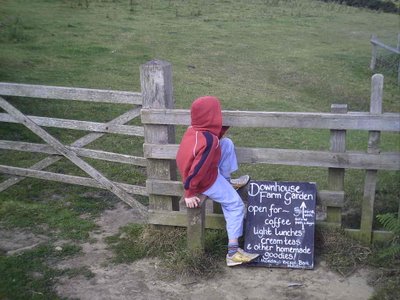
Tuesday, August 01, 2006
Silence
Qana: a massacre of 50 people, a similar number to the July 7 bombings in London, except more of them this time were children. People sheltering at the bottom of their apartment block. People who had been faced with the choice of either staying in a village that the Isreali air force was liable to bomb, or fleeing along roads that the Isreali air force was liable to bomb.
In Britain over the last ten years we have observed more and more one or two minute silences. They are based on the assumption that our society is united in valuing human life and mourning the passing of whichever public figure or group of innocent victims is being commemorated.
I will not observe any more such silences this year. If George Bush won't condemn the slaughter at Qana, and if there is still only an insultingly thin wafer between UK foreign policy and that of the US, then how can we pretend that we all value human life, and that we value all human life?
Thursday, July 20, 2006
This morning
I am celebrating by singing the REM tune 'do you believe they put a man on the moon' but changing the lyrics to suit whatever I am doing at the time.
At the breakfast table I sang 'do you believe, I've got some egg on my spoon, egg on my spoon'
On the 08:07 New Malden to Waterloo train I am writing these words and singing 'do you believe, I can type without much room, without much room'
Sunday, July 16, 2006
Contradictions
In the space of a Friday lunchtime, a visit to the Tate Modern got me thinking about what we human beings try to do with time and space:
- We divide up time and space because time and space are both indivisible
- We find ways of visualising time and space because time and space are invisible
- We fight for time and fight for space because time and space are infinite and unlimited.
My first stop was the fourth floor: back to Pierre Huyghe's One Year Celebration inside his Celebration Park. Huyghe's premise was that our calendar is a map, a map of the year, and the map has some uncolonised territory in the form of days which don't have a holiday attached to them.
At Hugyhe's invitation several artists and critics have come up with suggestions for colonising these days with celebrations.
Two of these proposed celebrations are attempts to resist the mapping of time, in order to escape the constraints that our mappings of time place on the way we live our lives and on the way we think about the universe.
Joe Scanlan suggested having an 'open day': a day slotted in somewhere between Sunday and Monday. Nothing can be scheduled for this day (because no-one knows when it is) and we can instead enjoy things in life that don’t need to be scheduled (Scanlon suggests that coffee, newspapers and cigarettes should be half price).
Another artist suggested a day out of the year, a revival of the Mayan practice of having one day in the year that wasn't included in the calendar, to remind everyone that time is greater than the calendar, that time is impervious to attempts to measure it.
I popped into the bookshop to flick through the book accompanying Celebration Park and noted Hughye' s comment (in an interview with Hans Ulrich Obrist) that he regarded time as a corollary of space. He talked about how a television programme exist mainly in time, but also in space, and differently from objects.
All this talk about the relationship between space persuaded me to pop upstairs to the fifth floor to revisit my favourite thing in the Tate Modern: 1,000 millimetres by Stanley Brouwn.
It consists of a card index box, containing 1,000 pieces of card. Each card has the words '1mm' written on it, above a horizontal line, in pencil, one millimetre long. So you have a thousand millimetres in the box.
There are no more or less millimetres in that card index box than there would have been if Brouwn had left the cards blank and saved himself the effort of drawing all those lines.
We have no way of adding a millimetre or a second to the universe.
As I was coming down the escalator from the fifth floor of the Tate Modern I had a Eureka moment. I solved the mystery of time and space: they don’t exist!
Monday, July 10, 2006
Genius is still genius
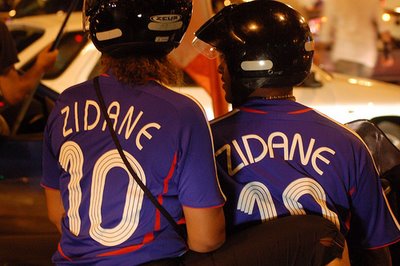
Photo by choudoudou
When I opened my eyes this morning, my first thought was of how Zinedine Zidane must be feeling, opening his eyes this morning.
I listened to French radio after the world cup final last night. I was impressed by the loyalty to Zidane of all those who reported or were interviewed. In the whole hour that I listened not person blamed him for the defeat, not one person used any words like shame or disgrace. Some expressed their thanks to Zidane for what he had done for France in this world cup and over the years.
One correspondent described the moment Zidane got sent off as like moving from 'le chaleur' of a Rio de Janeiro beach to ‘la froideur’ of a cold bath in the space of a split second.
Another correspondent described an empty café, with a lone man in a Zidane top clearing up the clutter left by the fans who had gone home. The correspondent imagined that some of the fans who had left the café were parents who had gone home to kids wearing Zidane tops too.
A convincing case could still be made for Zidane being the player of that tournament. He was pulling the strings again last night, throughout the second half and extra time. As a 34 year old, to be still bombing into the penalty area half way through extra time is a phenomenal achievement: compare with his fellow 34 year old Luis Figo who never seemed to last past the seventy-fifth minute of matches.
Does one lapse in self control wipe out fifteen marvellous years? it depends what you want to remember people for, and what you want to see in people.
I’m reminded of the Nottingham Forest fans on at the end of the 1992/93 season, defiantly singing ‘Brian Clough is a football genius’ as they watched their team get relegated. They will have suspected that Clough was by then an alcoholic, and that his drinking had contributed to the relegation, but they also knew that he had preformed football miracles for them.
Saturday, July 08, 2006
Today we celebrate unlikely but uplifting combinations
Pierre has used his exhibition at the Tate Modern to display the new holidays to the public for the first time.
The day I am most looking forward to is the day celebrating our sense of anticipation. But no date has been set for that yet.
The most enlightening holiday will be the day of rational certainty. On that day we will be enjoined not to cross our fingers or worry about stepping on the cracks in the pavement. The horoscopes won’t be published. Temples, churches and mosques will shut their doors for the day.
The results of the day will be interesting. Can we base our lives solely on things that can be rationally proven? We don’t know what time is, or how many dimensions there are in the universe, or why the universe was created, or why a table feels solid when the atoms that it is made of consist mainly of empty space. We need metaphors, assumptions, beliefs, and maybe even faith, to bridge these gaps.
The day will necessitate a temporary laying aside of the existing public explanations of the nature, purpose, and destiny of the universe. It will thus provide you with a bit of space to come up with your own answers to these questions, whichever answers help you pursue whichever type of life you most want to live.
Julia Cameron in her book The Artist's Way urges anyone wanting to make more use of their own creativity to come up with their own view of why the creator of the universe created it and what that creator is like.
I like to think of the creator of the universe as a being that is not all-knowing, but is instead all-learning: learning from the new things that are happening all over the universe all the time. That learning isn't stored by the creator seperately from the universe, the learning is stored in the universe itself. The universe works to both use some of that learning and to keep on creating new situations for new learning.
The creator of the universe created it because no universe had been created before, and the happiness and beauty it could potentially generate might well be worth the inevitable pain.
Later in the year another Hugyhe holiday will celebrate the future. The curator Hans Ulrich Obrist asked his artist friends to tell him what they think the future is. It is a nice twist, a curator asked to produce a work of art by an artist and doing so by curating the comments of other artists to create an exhibition within an exhibition within an exhibition. All the artists have come up with different little straplines for the future, thus confirming that not only do we not know what the future holds, we don’t even know what the future is.
We at World Flapjack day are a little disappointed that that this French led endeavour has not come up with a day to celebrate any of the wonderful things found in patisseries.
To make up for this omission we are proposing to make July 8 the celebration of ‘unlikely but uplifting combinations’.
On this day evey year people will be enjoined to take the day off to combine different things that they like but don’t normally do at the same time. This is so often a sure fire recipe for happiness in life.
The inspriration for this day came from the Banauchoc: a pain au chocalat with banana in. (you can get them from the Panos bakery on the concourse of Brussels Gare du Midi station).
Some of the things I like doing are: playing chess, having a bath, meeting new people, learning new languages, getting fresh air. In Budapest at the Szechenyi Baths you can stand for hours in an open air thermal bath, play chess with a waterproof chess set and improve your Hungarian.
We at World Flapjack Day support Pierre’s endeavour. and will be celebrating each of these new holidays as they come through the year.


Photos of Szechenyi baths by phnk
Sunday, July 02, 2006
Kick
Andrew (aged 7) switched the telly off and ran out of the room when Jamie Carragher missed his retaken penalty. The miss gave Christian Ronaldo the chance to knock England out of the tournament if he scored his penalty for Portugal.
I switched the telly back on in time to see something that impressed me. Ronaldo picked the ball up and kissed it. He was taking time to say that whatever the level of pressure on the moment, he loved playing football. He put the ball down on the spot and then chipped it into a part of the net that no goalkeeper could ever reach.
A triumph of love over fear.
Looking back on it it was inevitable that England would lose. They had played poorly all tournament, the manager had run out of ideas four years ago and only stayed in his job becase it would cost the FA to much money to end his contract. He didn’t seem to be able to adjust to injuries to his first choice strikers.
The only thing keeping England going was the superstitions of fans but even they seemed to have run out by the Quarter final.
Andrew had worn his England wristband, given to him by one of his teachers at school, continuously from the start of the tournament, and told us how it made England win, because his teacher had made it magic. The wristband fell down the toilet three days before the Portugal game.
Sunday, June 25, 2006
Permanent marker
Tate Modern commissioned Dan Perjovschi to draw with permanent marker all over the member's room. I went to see the drawings before, like all permanent markings, they got scrubbed off.
My favourite was the one showing the bus driver and passengers looking glum but the advert on the side of the bus showing someone looking as happy as Larry.
There will come a time when the panels on the side of public transport are simply screens , connected to the internet, which could display any combination of image and message.
Thursday, June 22, 2006
Reduced to almost nothing
My favourite was the one suggesting that instead of building Renzo Piano's shard of glass, we should build a massive grain of sand. This would serve as a tribute to William Blake, and as a reminder to people that we are present in the universe.
Here is the quote from Blake's Auguries of Innocence:
''To see a world in a grain of sand
And a heaven in a wild flower,
hold infinity in the palm of your hand
And eternity in an hour.''
Saturday, June 17, 2006
Let’s be
At the age of 79 Borges had made the following brave and honest statement in a lecture entitled Immortality:
‘’I don’t want to continue being Jorge Luis Borges: I want to be someone else. I hope that my death will be total: I hope to die in body and soul.’’
Borges does not claim to know what will happen after his death. He does not deny that there is a possibility that he might find himself re-incarnated as another being, or that he might find eternal life in heaven. But he is saying that he does not desire either re-incarnation or eternal life.
Later in his lecture Borges describes how some of the things that he has said and done will live on in the words and deeds of people to come. This is the way that Borges does want to live on in the universe: in the same way that Borges himself has kept alive Shakespeare,Dante, his own parents, neighbours and acquaintances by using and remembering their words and deeds.
I hope Borges got his wish. I am not convinced that eternal reincarnation or eternal life for one individual entity is in accordance with the spirit of the universe. The universe seems to be more interested in re-using and re-combining things than in ring- fencing and preserving things. The greatest gift of the creator to this universe is evolution: the fact that life can learn and adapt and new life forms can develop which are novel and different.
Why would the universe need a James Lappin in a million years time? What possible use would ‘I’ be to anything?
Jeff Barry, who lives in Borges’ home city of Buenos Aires, blogged last Wednesday about this same quote, as part of his wonderful series of blog posts called ‘30 days with Borges’. I’ve posted each of the 30 days to a del.icio.us page if you want a quick way of accessing all thirty of them.
Thursday, June 15, 2006
Uncertainty now
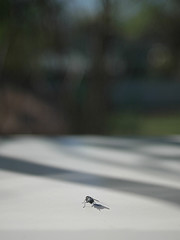 Photo of me in Blackfriars yesterday. The photographer (Seize the Dave) must have taken it from the top of St Paul's Cathedral.
Photo of me in Blackfriars yesterday. The photographer (Seize the Dave) must have taken it from the top of St Paul's Cathedral.Jorge Luis Borges came up with a comprehensive classification of all living creatures. He attributed the classification to Dr Franz Kuhn and it was the organisational basis of a Chinese Encyclopedia called the Heavenly Emporium of Benevolant Knowledge.
It has often been held up as an example of the potential absurdities of classification, but I have learned something quite profound about my appearance from it: I look like a fly from a distance
Here is the classification in full:
a) those [animals] that belong to the emporer
b) embalmed ones
c) those that are trained
d) suckling pigs
e) mermaids
f) fabulous ones
g) stray dogs
h) those that are included in the classification
i) those that tremble as if they were mad
j) innumerable ones
k) those drawn with a very fine camel’s hair brush
l) etcetera
m) those that have just broken the flower vase
n) those that at a distance resemble flies
I must look like a fly from a distance, it is the only category I fit into. Continually breaking flower vases is not a viable option socially or financially.
Most people seem not to notice, either because they are standing to close, or because their eye is tricked by a curious effect of an uncertainty principle which is caused by the following:
- When I look like a fly from a distance I am included in the classification, and therefore must move from category n) to category h).
- As soon as I join category h) there is no necessity for me to look like a fly from a distance
- As soon as I stop looking like a fly from a distance I am no longer in the scope and therefore, need to look like a fly again (from a distance).
This Uncertainty principle can be stated something like:
- You can determine precisely the position of a living creature within Borges’s classification, and you can determine whether or not it looks like a fly from a distance, but you can not determine both things at the same moment in time.
It just shows how much effort is required to fit into someone else's world view
Sunday, June 11, 2006
Possibilities
 Photo: Forth bridge by Aesop
Photo: Forth bridge by AesopThere are an infinite number of parallel lines on the same plane. They reach backwards to infinity and forwards to infinity and are destined never to touch each other.
Along the path of each infinite line there are an infinite number of points. At each of these points the line is crossed by an infinite number of other lines, coming from different angles on the same plane; or from different planes; or from the past or the future.
Each one of these lines has something in common with the creator of the universe (as described in many of the great spiritual traditions): it has no beginning and no end in either space or time.
Thus the creator of the universe was never lonely, never bored with the emptiness. There always was an infinite number of infinite lines, but a creative spark was needed to make something finite out of them, something that wouldn’t last for ever, and could grow into anything.
After 29 years in Weybridge (Surrey, England) my mum and dad are settled back in Dalgety Bay (Fife, Scotland), where they spent their first decade of married life, and where me and my sister were born. I was so pleased to hear both of them sound so happy when they rang me on Friday.
Hats off to my mum for masterminded the move. Douglas Adams said that it was a good idea to redefine yourself at least once after you reached the age of 50. He did it by moving from England to Los Angeles. My mum has done it twice.
After retiring from teaching twelve years ago she took up embroidery. She found a creative streak noone knew she had and produced really lovely work based on patterns in things that inspired her, the gradual decay of old walls, the canal, rooftops of a Japanese town.
Then she started producing work based on motifs from the Forth bidge: everything from wall hangings to a toilet roll holder.
That is the great thing about doing anything creative, and about expressing your creativity: it’s such a good way of honing in on what you really love in life, like diving rods for water.
They can see the Forth bridge from their new home.
Friday, June 09, 2006
One zag
Is there a word for a word which sounds like the letter that the concept it represents looks like?
Do geometry professors use the word zigzag? Or is it just a lay term?
Does the zig zag count as a shape or is it just a pattern? What if someone drew a zig zag line that went round in a circle and joined up with the start of the zig zag line again. Would that count as a shape? Would it be a zigzag shape or a circle?
Did Euclid have anything to say about zig ags?
What do languages without the letter ‘z’ in their script call zigzags?
Does the word ‘zigzag’ have anything to do with the word ‘ziggurat’ or do they just sound the same.
Good luck to people leaving England on great adventures today:
- Val heading south to the world cup in a van
- Mum and dad heading north to their new home in Dalgety Bay
Wednesday, June 07, 2006
Reflection
This is a mirror.
You are a written sentence
Luis Camnitzer issued the above statement as a work of art in 1966: one of nine statements on sticky labels that he sent out by post.
In Chronology Camnitzer explains why he had stopped making pictures and prints and started producing these statements. He had been looking for ways in which his art could escape from the trap that once someone bought the art object it was lost to the rest of the world.
He discovered the answer staring out at him from his local newstand. He states:
The ideal was the newspaper headline: a simple reading allowed appropriation which then unleashed imagery within the viewer. Material possession of art would lose its meaning since possession would take place through reading
I love this quote about the later development of his art:
I discovered (1971) that if I made a minimal mark on a piece of paper, I irrevocably altered the order of the universe. Any new order would have to include my mark. My action conditioned any new definition of order. Thus, to change the universe wasn't that difficult and anybody could do it. It was more difficult to convince the art market of the fact that the alteration had taken place.
Thank you to the Lehman College Art Gallery for making the full catalogue of their Camnitzer retrospective available online, including articles by and about Camnitzer.
Saturday, June 03, 2006
242
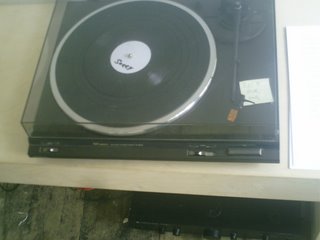
I took the 242 bus to Shoreditch to see ‘Some pictures and a song’ – Claire Harvey’s installation at Store.
I was tempted up Hoxton Street having read that the installation includes drawings of people on scotch tape, stuck onto the walls. I imagined the walls plastered with hundreds of these figures, like the end of a brainstorming workshop gone mad.
It is more restrained than I'd anticipated: the sticky tape people are confined to a small area of one wall, over in the corner, by the front window of the gallery. Each drawing is made on two pieces of sticky tape: one for the person, one for their shadow.
They are a loose collection of people, walking away from me; detached from me; detached from each other; detached from the ground on which their shadow would have been cast; and as the title of the piece acknowledges, easily detached from the wall.
On the other side of the window I was aware of the occassional passer by walking down Hoxton Street to the college next door and the little shops.
The installation really came to life when I took up the invitation on the record player to play the 7inch single that sat on the turntable.
I heard Harvey sing a wistful song about a fly who fell victim to her botched attempt to save it after it had flown into her studio and got stuck on some oil paint on one of her paintings that had not yet dried.
As I listened I looked around the gallery: bare wooden floor, some oil paintings on the wall, Hoxton outside.
The paintings on the wall are neither large nor bright. The colours used are greyish blue and white. Some of the paintings show people on the edge of the land and the sea, alone but not lonely, absorbed in what they are doing.
One shows a close up painting of a person’s face, smelling a cheese, what is he thinking as he inhales? The next painting pans back, and shows all of the cheese smeller, it’s a young man. The title of the picture (cheese counter) betrays the fact that he is in a supermarket, but the hazy blue/white/ grey way the cheese counter is painted makes it looks as though he too could be on the edge of land and sea.
The installation took me right back to student days . Maybe because the room was bare, or because it was a record not a CD player, or because no-one in the installation was in a rush, or wearing a suit (unless you count me standing there with my rucksack on my back), or doing anything particularly demanding.
The lady at the gallery said to me ‘its like slipping back into a familiar memory of something that never actually happened to you, just like the fly story may never have happened’.
(The exhibition is running until 1 July 06: read Russell Herron's account of the private view)
Wednesday, May 31, 2006
Do you remember an exhibition in a car?
The curator of en route via another route commandeered a car of the Trans Siberian express train to Beijing. It left Moscow on September 12 2005, the day that England drew the fifth test to win back the ashes.
I would have loved to have been on that train:
• To have read out, live on Trans Siberian Radio, a Russian translation of Keith Arnatt’s ‘Is it possible for me to do nothing as my contribution to this exhibition?’
• To have released some balloons and watch them float into the big skies of the steppe bearing the slogan ‘all that is solid melts into air’
• To have sat in the dining car , seen the abandoned dinner on the table, and read Gabriel Kuri’s note in Russian explaining that the person who had purchased it had left in a hurry. To find out how many countries the train would have to pass through, and how many translations of the note would have to be made, before anyone took up the invitation to eat the dinner.
Well worth missing the cricket for!
Were you there? Did you enjoy it? Did anyone eat that dinner?
Friday, May 26, 2006
Nothing
In 1970 Keith Arnatt produced a work of art entitled
‘Is it Possible for Me to Do Nothing as My Contribution to this Exhibition?’
The work consisted of a written statement in which he explored several different ways of doing nothing as a contribution to an exhibition.
All the ways of doing nothing that he identified, actually involved doing something. Even if that something was as simple as:
- putting forward the idea ' I have done nothing' as a contribution to the exhbition
- requesting some space within the exhibition in which 'to do nothing'
- making the statement 'I will do nothing' and sticking to it for the duration of the exhibition
Arnatt was using conceptual art (art using ideas and language) to show the limits of conceptual art.
Lawrence Weiner made a famous statement about conceptual art to say that:
An artist can come up with an intention for a work of art and then:
• Might make it themselves
• Might get someone else to make it
• Might decide not to make the intention into a physical reality at all
Either way in Weiner’s view you still have a work of art that can be distributed, received and owned.
Arnatt has come up with an intention for a work of art that can not be made by the artist or by anyone else, and the intention of which can not be communicated by the artist to anyone else.
(I haven't been able to find the text of Arnatt's work on the web, but it is reprinted in full in the book 'Six Years' by Lucy Lippard.)
Wednesday, May 24, 2006
Things on walls
 Photo by ebmorse of 'The Wall that Went for a Walk' at Stormking USA
Photo by ebmorse of 'The Wall that Went for a Walk' at Stormking USAAndy Goldsworthy builds walls that have renounced their mission, forgotten the boundary line that they were supposed to demarcate, and gone for a walk. They wind their way around and between trees, up and down hills, and into and out of ponds.
Last year part of ‘The Wall that Went for a Walk’ at Grizedale Forest in the Lake District got blown down by the wind.
This month ‘s Art Monthly reports that Goldsworthy declined the Forestry Commission’s offer to repair the wall. Goldsworthy said that:
‘I knew that change would continue after the making of The Wall and that I could not dictate or determine what that change would be’
The writer and physisist David Bohm identified the tendency of us human beings to defend our thoughts and opinions, to take up fixed positions. Bohm wrote:
we often find that we cannot easily give up the tendency to hold rigidly to patterns of thought built up over a long time. This kind of thought leaves no room at all intellectually for any other possibility
Goldsworthy has resisted the temptation to attempt to defend his wall, and recognised that no fixed state is sustainable over time.
Even if the Forestry Commission fixed it this time, for how long would they keep repairing it: 30 years, 100 years?
The act of repairing the wall would have seen the wall take back its mission as a wall again, holding back nature and holding back time. The wall that went for a walk doesn’t hold back anything.
Friday, May 19, 2006
Post-global art

Jem Finer has meshed together the three spheres of the world wide web, the night sky and the earth.
He has found a website for every star : a website that names someone, somewhere or something on earth that shares or contains the name of the star.
You can find the links to these websites in 'On earth as it is in heaven', which provides access via his old readers digest atlas to a set of world maps: one global double page spread per constellation.
Each star in the consellation is plotted onto the atlas at the point of the earth where the person/thing/place that shares its name is located. Click on the star and the link takes you to the website that identified it. All the stars joined up by lines which make a new earthly shape for the constellation.
The picture above is the map for the constellation Orion . I was hoping that Jem would have found something about Betalgeuse in Guildford (where Arthur Dent thought that Ford Prefect came from). But instead the point is situated in New York, home of the Betalgeuse film and TV production company.
Stars, earthly towns and cities, websites, : lasting for billions of years, hundreds of years, years. When we come to map them we only have our human recognition of shape, our shared myths, and our understanding of words with which to map them with.
We have nothing anywhere near as potent and user friendly as the constellations with which to navigate our way around the world wide web.
Tuesday, May 16, 2006
Blank (700)
Leaving some words blank for the kids to fill in is more fun than making up the whole story yourself.
Last night’s story went like this:
Two (blank) lived on the moon. Their house was on the edge of a (blank). In their bedroom was an enormous (blank) made out of (blank). In their living room was an enormous (blank) made out of (blank).
The blanks filled in by Andrew and Anna were:
1 children, 2 crater, 3 blanket, 4 lettuce, 5 sofa, 6 cucumber.
The last delivery rocket to the moon had been filled half with lettuce and half with cucumber.
There was no cucumber left after making the sofa so the family have been eating lettuce salad for the past seven weeks .
They have all been tempted to pick at the sofa to get some cucumber to liven up the lettuce salad. But so far they have managed to restrain themselves.
They next delivery rocket is scheduled to reach the moon at bedtime tonight. It is going to bring them (blank) and (blank).
Monday, May 15, 2006
The impossibility of choosing (433)
On the Tuesday night I was sitting out in George’s square, enjoying the Glasgow jazz festival, and wondering why I hadn’t followed the Scot in me and gone to University there when I was 18.
On the Wednesday night I was walking into Manchester’s Cornerhouse centre wondering why I hadn’t stayed followed the Smiths fan in me and gone to University there when I was 18.
It struck me that the two regrets were contradictory.
Some versions of quantum theory hold that for every choice you have made, the alternative paths that you didn’t take are followed by another you in a parallel universe.
Other theories state that if our universe is infinite in scope and duration then somewhere else in our universe, on a planet just like ours, another person just like you has taken/is taking/will take all the different paths that you chose not to take.
The ‘mis-guide to anywhere’ gives the following advice:
‘’in a place that is new to you, dream that you live there. Go on a quest to find this other self. Find the place you live; the place you work; the routes you take to see your family; the places where your friends hang out; your favourite places to eat or read or daydream; the places of crisis in this other life; the points of meeting and departure; the places of grief; the places of joy; the place where you can get the best plain pillowcase; the places where you can pick fruit from the trees; the place where you can get funny cards with the message spelled wrong; the places where your children might be born and the place where you might die. Live this other life for a day’’
Wednesday, May 10, 2006
Nostalgia (253)
It shows Morrissey and Jonny Marr in 1984, taking a group of young school kids on an open topped bus to a sunny Kew Gardens, where they meet Sandie Shaw. They find a nice place to sit and listen to Sandie sing 'Jeanne' while Jonny played guitar.
I love the contrast between the sun shining on an idyllic setting, and all the kids enjoying themselves, having an ice cream, and Sandie Shaw singing the saddest of all the Smiths songs
'Jeanne, I don't know what happiness means, but I've looked in your eyes, and its not there'set in the bleakest description of late 70s Manchester
'Jeanne, there is ice in the sink where we bathe, how can you call this a home,when you know its a grave?'
Tuesday, May 09, 2006
Conference (293)
In a break in the proceedings I visited the Cube (Centre for the Understanding of the Built Environment), to see their exhibition Found shared: the Magazine Photowork.
There is a good review of the exhibition by Redeye
Editors of Magazine photoworks collect already existing images and collage them together to make a magazine.
They look, feel and smell like convential magazines, but the experience of reading them is different. They do not attempt to inform or entertain you. They do not pretent to be ‘current’. The images inside them have a history, a previous life of their own. But you aren’t told what that previous life is. They are just presented as though those pictures were always meant to be grouped together.
The character of the magazine photoworks depends in part on where the editors get the pictures from:
Ohio finds its pictures in photographic archives, archives of different small societies or organisations. It takes these dull photos that would never see normally see the light of day, from totally unconnected archives, and presents them for you to read into them what you will.
Found is made up of bits of paper, notes and photographs that people have found in the street, or on trains, buses etc, and sent into Found. The Found website has things posted every day that people have sent in, but visually the magazine is more of a treat because of the effort that has gone in to fit all these things together on the pages to look like a magazine.
Permanent food takes their images from glossy magazines, and makes a new magazine out of them all that looks just as glossy, sensational and edgy as the type of magazines the pictures come from.
My favourite thing in the exhibition was a film called Helicopters made by Ohio. The film consisted of a succession of still pictures which happened to contain a helicopter, set to a musical background. In most of the pictures the helicopter was an incidental detail and in some it was just a smudge.
I chose to buy the latest issue of Permanent Food, mainly because on the contents page the section that started on page 73 was entitled ‘Back to the Old House’ (title of an old Smiths song). I have no idea whether the contents page was written by Permanent Food as some sort of commentary on the pictures they have brought together, or whether it was copied from another magazine and collaged into Permanent Food like all the rest of the pages.
Sunday, May 07, 2006
Other peoples titles (28)
Yesterday we were just turning out of our road when andrew (age 6) asked
'have you ever tasted anything in a dream?'
On the Isle of Wight we were driving to to Brading Roman Villa when Anna (aged 3) asked:
'Where people made when the Romans were here?'
She had been to the Dinosaur museum the previous day and I think she was just arranging geological and historical time in her head.
I would love to use these as blogpost titles. What if I made a seperate list of potential blogpost titles, that I haven't been able to use while I am busy trying to use up Bruggerman's potential exhibition titles?
Saturday, May 06, 2006
Unfinished projects and ways of presentation (312)
You can buy a copy of it in fanzine form for £2 from his website: www.ecartilage.co.uk
In his forward to the fanzine Wes tells us how he had planned to spend till 2010 rearranging the whole of the King James Bible into alphabetical order. The project was first delayed (because of laptop failure) and then abandoned (because Wes read of Simon Popper's alphabetical rendition of Ulysses in this years Becks Futures exhibition).
If the story in the forward is true then it is one of art’s great coincidences that Popper exhibited his edition while Wes was starting on his. But I’d like to believe that Wes has made up the story, and in so doing has taken Popper’s idea and done something new and original with it.
Friday, May 05, 2006
It is really nothing (465)
Three days before my 16th birthday.
The first song they sang was 'William it was really nothing'
Not a bad debut eh?
In the song Morrissey tells a suburban male that ''it was really nothing....... it was your life''. And somehow that has always come over to me as a very liberating and reassuring statement.
Nice to have it confirmed by another Steven (Bruggeman).
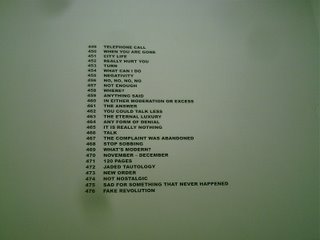
Wednesday, May 03, 2006
List
There is no better Oulipo resource on the web than Derek Badman's list of novels written using Oulipo-like constraints.
Not the least pleasing of the novels listed was ‘Negativeland’ by Doug Nufer.
No sentence in Negativeland was expressed with a positive construction.
Nufer does not discount the possibility that the inspiration for this was the number of rejection letters he had received from publishers for his previous novels.
It was announced this week that Stefan Bruggeman’s ‘Show titles’ did not win the 2006 Becks Futures art prize.
Monday, May 01, 2006
Can't wait for tomorrow (287)
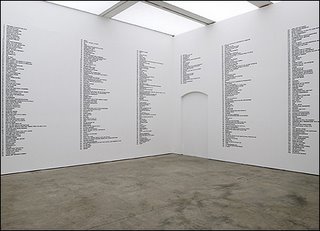
Stefan Brüggemann has painted 728 potential exhibition titles onto the walls of the ICA, in his entry for the 2006 Beck's Futures competition.
I believe that the winner of the competion will be announced today.
Bruggeman says anyone is free to use the exhibition titles if they want to. He offered first choice from the titles to the organisers of the Becks Futures exhibition themselves, and they chose a title for each of the three venues that the exhibition is being staged (London, Bristol and Glasgow).
The title for the London Becks Futures at ICA is ‘Can’t Wait for Tomorrow’, the 287th of Bruggeman’s titles.
- I have decided to put all of these titles to good use: I am going to us them as the titles my next 728 blog posts.
- I will not use any other titles until I have got through all of Bruggeman’s titles.
- I will not use any title more than once.
- I will use the titles in any order I like
- I will make a blog post a day
- I'm starting with this post: 727 to go now!
Saturday, April 29, 2006
Not a word
It shows the work of inspired and talented artists who weren’t part of the art world, and had never received any art training. People like Madge Gill who never sold any of her drawings in her lifetime because she didn't want to offend the guiding spirit who she said inspired them. Most of the drawings were found piled up in her bedroom when she died.
There is drawing from Gill that runs the length of one of the galleries, with the picture of the same woman appearing again and again in a swirl of shapes and colour. Apparently Gill would get a long roll of Calico and she would draw a bit, cover the drawing up and then unroll the next bit. until she had covered up the whole roll with her drawing. Must have taken months.
On the way out of the exhibition I was interviewed by the Independent on Sunday. The journalist took a photo. Might quote me in the paper this Sunday. I should have mentioned this blog, I might have got a free plug for it.
I went into the Gallery bookshop to buy an art mag. While I was there I bought, on impulse, a book by one French post-modernist philosopher (Deleuze) about another (Foucault). The reason I bought the book is that its opening sentence reads
‘a new archivist is appointed. But has anyone actually appointed him? Is he not acting rather on his own instructions?’
Its not often my proffession gets such a privileged mention in in philosophical texts. (I confess to not yet having read ‘Archive fever’ by Jacques Derrida).
So buy the time I had left I had spent £15. A tenner more and I could have had one of Sehgal’s words.
It is easy to spend money at the Whitechapel art gallery bookshop and the ICA bookshop. Sehgal is taunting me by selling his 100 words in the ICA bookshop. He is saying to me, ‘’you want to buy half the books and magazines in this shop. And yet you will end up spending £25, taking away nothing, for the sake of hearing one word’’
Maybe I should resist the Sehgal temptation, and use a line from a Smiths song instead to re-title this blog. That would be free.
Monday, April 24, 2006
Misguided
In the MisGuide they develop the old situationist idea of using a map of one city to navigate around another. (a bit like the I'm Sorry I haven't a Clue game where you sing the words of one song to the tune of another).
They quote the example of a Ferris wheel moved from Paris to Birmingham in 2003. The wheel still had the French audio commentary installed. For several weeks people looked out on England’s second city whilst being told to look out for familiar Parisian landmarks.
If you are in London, Wrights and Sites suggest you get a map of Paris and use it to find where in London the Eiffel tower is. Stop along the way to enjoy the Parisian ambience, find a place for a Ricard and a croissant.
Tania and I inadvertently did something like this on our holiday in the Isle of Wight. On the bookshelf of the cottage we were staying in there was a pile of leaflets about places on the Island. The pile included a guide to Mottisfont Abbey.
The guide described the history of the Abbey. and its conversion to a manor house after the Reformation. The house has a drawing room designed by Rex Whistler. A river runs through its extensive gardens, which houses the national collection of roses.
A check of its facilities (with our hungry son in mind) revealed the existence of a café/restaurant open every day and serving hot meals.
Sounded good so we got in the car and drove over to the West of the Island. Got there at 12. Kids bored and hungry after an hour in the car. Restaurant turned out to be a tea hut, which didn’t take debit cards. No disaster, back in the car to the nearest village for an agreeable pub lunch looking towards the cliffs at Freshwater.
Should we go back? Might as well. After all, said Tania, it would be nice to see round the house. Back we go, spent an enjoyable hour helping Andrew and Anna find flowerpot men and women in the gardens.

(Here we found Dr Hoe and the Garleks)
Had a look at the house. It didn’t look much like an abbey, it didn’t look very open either. It wasn’t open.
A conversation with the Reception staff revealed that Mottisfont Abbey isn't on the Isle of Wight. We were at Mottistone Manor. The house in the gardens is a private residence which is open to the public one day per year (on the August bank holiday).
If I had known about the Mis-Guide we would have looked for the river and the rose collection.



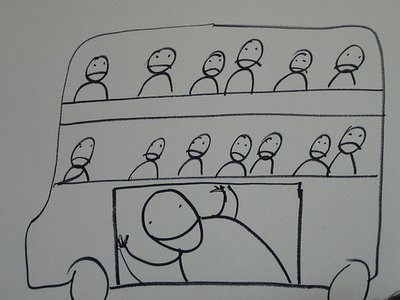
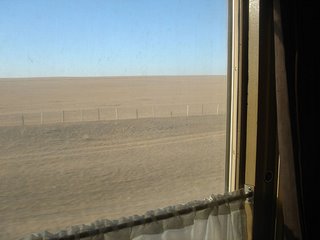 Mongolia
Mongolia